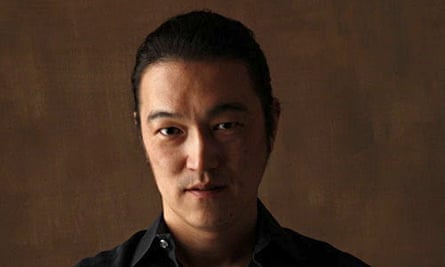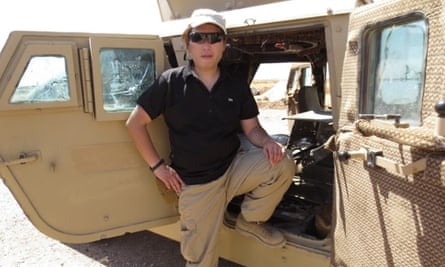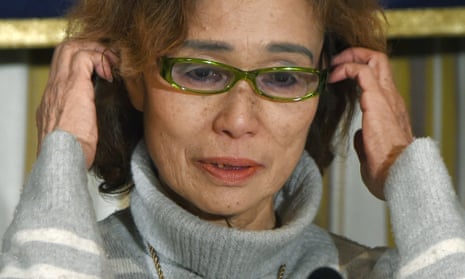The mother of one of two Japanese hostages being held by Isis has made an emotional appeal for his release just hours before militants have threatened to execute him unless Japan’s government pays a US$200m ransom.
Junko Ishido, 76, said her son, freelance journalist Kenji Goto, was not an enemy of Isis, but had been motivated by a simple humanitarian desire to report from troubled parts of the world.
“My son is not an enemy of Islamic State,” Ishido told a packed press conference on Friday morning. Occasionally wiping away tears, she apologised for the trouble her son had caused and called on the Japanese government to secure his release, even if it meant paying the ransom.

Reports said Goto, 47, had gone to Syria last October to attempt to negotiate the release of his fellow captive Haruna Yukawa, a security consultant who was captured by Isis last August.
“I can only pray as a mother for his release,” Ishido said. “If I could offer my life I would plead that my son be released. It would be a small sacrifice on my part.”
Japanese authorities have been working with several countries in the region to secure the men’s release, but conceded that with just hours to go before the ransom deadline, they had yet to make contact with Isis. The Japanese government considers the deadline to be 2.50pm Japanese time (5.50am GMT) on Friday.
Public broadcaster NHK, however, said it had received a message from Isis “public relations” saying that a statement would be released sometime soon.
Ishido paid tribute to her son’s “kindness” and desire to help children in troubled parts of the world. She said she had been amazed to learn from Goto’s wife recently that he had left their two-week-old child behind to travel to Syria.
“I wondered how Kenji could leave his family behind like that, but he was determined to save his friend,” Ishido said. “But that’s the kind of person he is.”
Ishido said she had been racked by “tremendous grief and confusion” in the three days since Isis released a video purportedly showing a knife-wielding jihadist standing between Goto and Yukawa, dressed in orange boiler suits.

The masked man, who has a British accent, gave Japan’s prime minister, Shinzo Abe, 72 hours to pay a ransom of $200m. This was equal to the amount Abe had recently pledged in non-military aid for Middle East countries fighting Isis, which Abe said included money to support countries hosting refugees from Syria and Iraq.
In the ransom video, Isis accused Abe of providing money to kill Muslim women and children and destroy homes, an accusation the Japanese government rejects.
Japan’s foreign minister, Fumio Kishida, said Japan was working with other countries to explain the humanitarian nature of Abe’s aid pledge. But he added: “We will not give in to terrorism. There is no change in our stance of co-operating with other countries to combat terrorism.”
Japanese officials have declined to say if they would pay any ransom, a move that could cause a rift with the US and Britain, which refuse to pay ransoms.
The government’s top spokesman, Yoshihide Suga, said Japan was trying all possible channels to reach those holding the hostages, but added that Japan had not received a message from Isis since the video was released on Tuesday.
In a last-ditch effort to free the men, who first met in Syria last April, Ko Nakata, an expert on Islamic law and journalist Kousuke Tsuneoka – both converts to Islam – issued a plea to the men holding Goto and Yukawa, 42.
“Seventy-two hours is just too short,” Nakata said in a statement he read out in Japanese and Arabic. “Please wait just a bit longer, and do not try to take action immediately,” he added. “If there is room to talk, I’m ready to go and negotiate.”
Nakata proposed offering $200m in humanitarian aid to refugees and residents of areas controlled by the Islamic State, through the Red Crescent Society. “I believe this could be a rational, acceptable option,” he said.
Tokyo’s most prominent mosque, the Tokyo Camii and Turkish Culture Centre, posted a statement calling for the prompt release of the hostages. It said Isis’s actions were “totally against Islam and have a serious impact on Muslim communities all over the world and put Muslims in a precarious position”.
Ishido said she accepted that some people believed her son had acted foolishly in travelling to such a dangerous region, but said he had gone with only honourable intentions.
“Ever since before he learned to walk, my son has been kind to all of the children he knew,” she said. “My son felt he had to do everything in his power to try to rescue a friend and acquaintance.
“He went to Syria to rescue a colleague. He thought that if he could speak directly to Islamic State he could make them understand. Our son has devoted his life to helping children … I am asking Islamic State from the bottom of my heart to let him go. He is not in any way an enemy of IS.”
